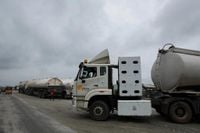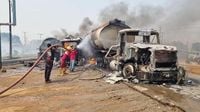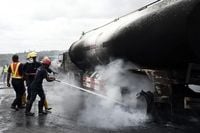A devastating tragedy struck central Nigeria on October 21, 2025, when a fuel tanker overturned and exploded along the Bida-Agaie highway in Niger State, killing at least 42 people and injuring dozens more. The incident, which unfolded near the Essan and Badeggi communities in the Katcha Local Government Area, has once again cast a harsh spotlight on Nigeria’s chronic road safety issues, economic hardship, and the perilous lengths to which ordinary citizens are driven in pursuit of fuel.
According to the BBC, the tanker, laden with petrol and traveling from Lagos to the north, skidded off the notoriously hazardous road and crashed, spilling its volatile cargo. As is tragically common in such incidents, local residents and passersby rushed to the scene, eager to collect the leaking fuel—a practice that has become all too familiar in Nigeria’s fuel-scarce economy. Moments later, the spilled petrol ignited in a massive fireball, engulfing those gathered and leaving many victims burned beyond recognition.
Abdullahi Baba Ara, head of the Niger State emergency service, confirmed to the BBC that at least 42 people lost their lives, while 52 others with varying degrees of injuries were receiving treatment at a nearby hospital. Other agencies, including the Federal Road Safety Corps (FRSC), reported slightly different figures in the immediate aftermath—reflecting the chaos and difficulty of tallying casualties in such catastrophic events. The state emergency agency later told AFP that the death toll had climbed to 39, with 60 injured, as rescue efforts continued into the following day.
The harrowing scene was described by Ibrahim Hussaini, a local coordinator for Nigeria’s national emergency agency, who told AFP, “People went to scoop up the fuel. The truck exploded and they got burnt.” The scale of the tragedy was compounded by the fact that many of the injured suffered severe burns, and the intense blaze made identification of victims extremely challenging.
Incidents like this are, heartbreakingly, not rare in Nigeria. As Reuters and Caliber.Az both reported, the country’s reliance on road transport for petroleum products—due to limited pipeline infrastructure—has made such disasters almost routine. Poorly maintained roads riddled with potholes, lax enforcement of traffic laws, and the absence of a viable rail network have combined to create a deadly environment for both drivers and communities. Farouk Mohammed Kawo, chairman of the Nigerian Fuel and Gas Tanker Drivers’ Union, told Channels Television that about 30 similar accidents had occurred in Niger State in October 2025 alone, calling the tragedy “devastating and avoidable.”
The economic backdrop to these recurring tragedies is equally grim. President Bola Tinubu, in a bid to revive the nation’s struggling economy, ended fuel subsidies and currency controls upon taking office in May 2023. According to AFP and BBC, these reforms, while intended to stabilize government finances and attract investment, unleashed a cost-of-living crisis that has left millions of Nigerians struggling to afford basic necessities—including fuel. As a result, many are willing to risk their lives by scavenging petrol from crashed tankers, despite repeated warnings and public awareness campaigns.
Governor Mohammed Umaru Bago of Niger State expressed deep sorrow and frustration over the latest disaster. In a statement cited by BBC and Channels Television, he said, “It is disheartening how people have continued to approach a fallen tanker to scoop its contents” despite several awareness campaigns. He described the incident as “worrisome, unfortunate and pathetic,” and extended his condolences to the affected communities. His chief press secretary, Bologi Ibrahim, echoed these sentiments, lamenting the persistence of dangerous behavior in the face of repeated tragedy.
Authorities have launched an investigation to identify the driver, the owner of the tanker, and the exact cause of the accident, according to police spokesman Wasiu Abiodun, as reported by The Associated Press. While the immediate trigger was the tanker’s loss of control on a treacherous stretch of road, the underlying causes run deeper—rooted in systemic neglect, economic desperation, and a lack of infrastructure investment.
This latest explosion is part of a grim pattern. In January 2025, at least 98 people died in a similar incident in Niger State after gathering to collect fuel from a crashed tanker. That disaster prompted President Tinubu to order a national campaign to raise public awareness about the risks and environmental hazards posed by collecting fuel from fallen tankers. Yet, as the events of October 21 show, changing behavior in the face of poverty and scarcity is no easy task. In October 2024, another tanker explosion killed 153 people in Jigawa State, further underscoring the deadly consequences of Nigeria’s fuel distribution challenges.
The frequency of these accidents is exacerbated by the strategic importance of Niger State itself, which serves as a major transit hub for commodities moving between Nigeria’s north and south. The heavy volume of traffic, combined with inadequate road maintenance, creates a perfect storm for disaster. Analysts have repeatedly pointed to the urgent need for investment in both road repair and alternative transport infrastructure, such as pipelines and railways, to reduce the reliance on dangerous road tankers.
Despite the ongoing national campaign and repeated government warnings, the economic pressures faced by ordinary Nigerians remain acute. With fuel prices soaring after the removal of subsidies, many see scavenging as a necessary—if perilous—means of survival. As AFP and Reuters observed, this desperation is unlikely to abate until broader economic and infrastructural reforms take hold.
In the immediate aftermath of the explosion, emergency services and local hospitals were stretched to their limits, struggling to treat the injured and account for the missing. The nation watched in anguish as images of charred vehicles and grieving families spread across social media and news outlets, a stark reminder of the human cost of systemic neglect.
For now, the people of Niger State—and Nigeria as a whole—are left to mourn yet another avoidable tragedy. The hope is that this latest disaster will spur a renewed commitment to road safety, infrastructure investment, and policies that address the root causes of both poverty and peril on Nigeria’s highways.
As the smoke clears over the Bida-Agaie road, the urgent need for change has never been more painfully clear.



